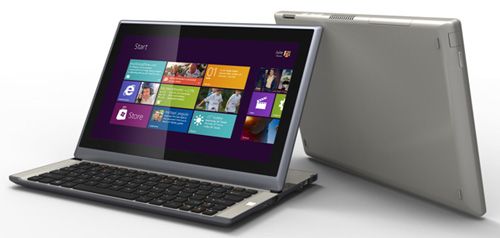 MSI is working on second generation Ultrabook which features a touchscreen and convertible functionality. The S20 is a convertible Ultrabook which uses a sliding design, much like the Asus Eee Pad Slider and long forgotten (and never sold) Samsung Slider 7. The MSI S20 is equipped with Windows 8 which Microsoft has retooled for touch input with the Metro interface (pictured above). The S20 is exciting because it will be one of the first touchscreen convertible Ultrabooks with both Ivy Bridge and Windows 8 — a combination that could actually represent a good touchscreen computing experience in the world of mainstream PCs for the first time. We tracked down preliminary details for the S20, step inside to have a look at this exciting sliding Ultrabook.
MSI is working on second generation Ultrabook which features a touchscreen and convertible functionality. The S20 is a convertible Ultrabook which uses a sliding design, much like the Asus Eee Pad Slider and long forgotten (and never sold) Samsung Slider 7. The MSI S20 is equipped with Windows 8 which Microsoft has retooled for touch input with the Metro interface (pictured above). The S20 is exciting because it will be one of the first touchscreen convertible Ultrabooks with both Ivy Bridge and Windows 8 — a combination that could actually represent a good touchscreen computing experience in the world of mainstream PCs for the first time. We tracked down preliminary details for the S20, step inside to have a look at this exciting sliding Ultrabook.
Tag Archive | "msi"

Sliding MSI S20 Ultrabook with Ivy Bridge and Windows 8 — First Details Emerge
Posted on 04 June 2012
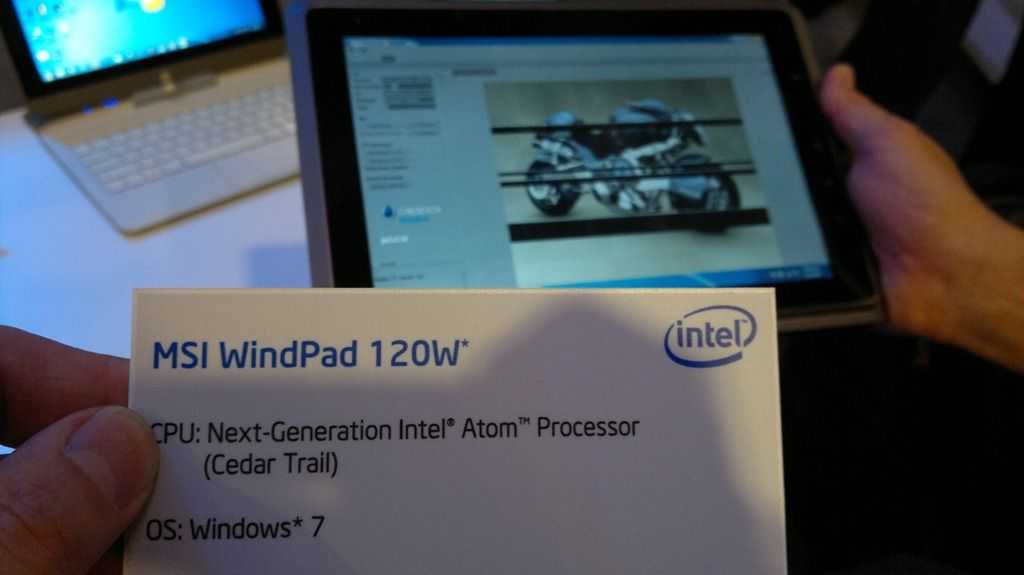
MSI Windpad U120W. Video Overview, Cedar Trail N2600 Test
Posted on 28 September 2011
The MSI Windpad 120W is the Cedar Trail version of the Windpad U110W – an AMD Fusion device. We reported on the 120W in June where it showed at IFA with a Cedar Trail 1.86Ghz CPU. We saw it at IDF a few weeks ago and it had a low-power platform inside. We had the chance to give it a few tests.
The Windpad 120W shown at IDF used the Intel Atom N2600 with 32nm CedarView-M with dual-core, 2-threads per core (contrary to specs) and 1.6Ghz clockrate. The PowerVR SGX545 graphics operates at 400Mhz and forms part of the GMA graphics unit. The TDP is 3.5W and it is coupled with a communications chip (NM10) that uses 1.5W.

We only had time to do some CPU and battery tests but in Cinebench R10 we get a good idea of the CPU performance. A multi-core result of 1507 matches Atom N550 and very closely.
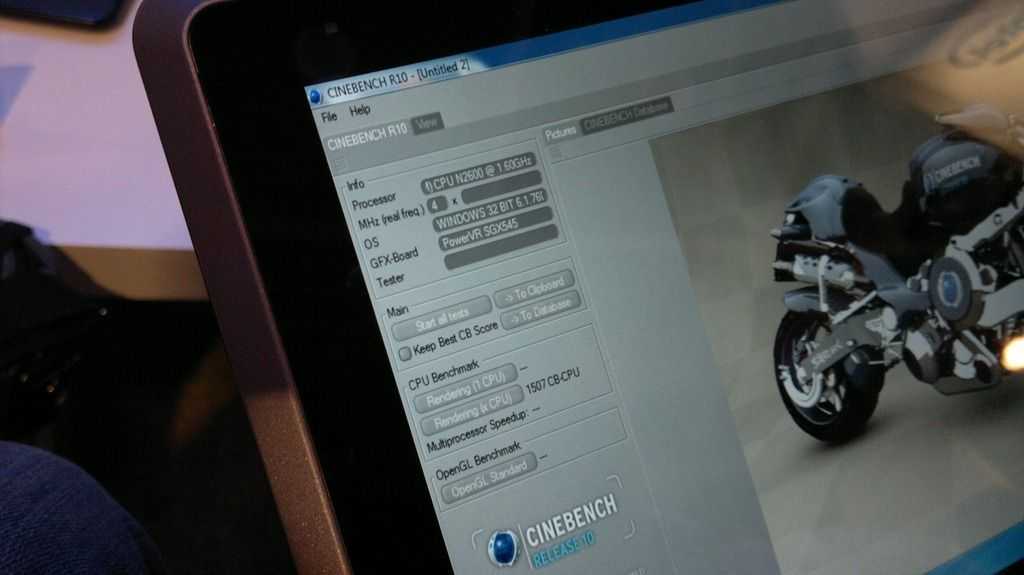
The 120W comes with 2GB of RAM
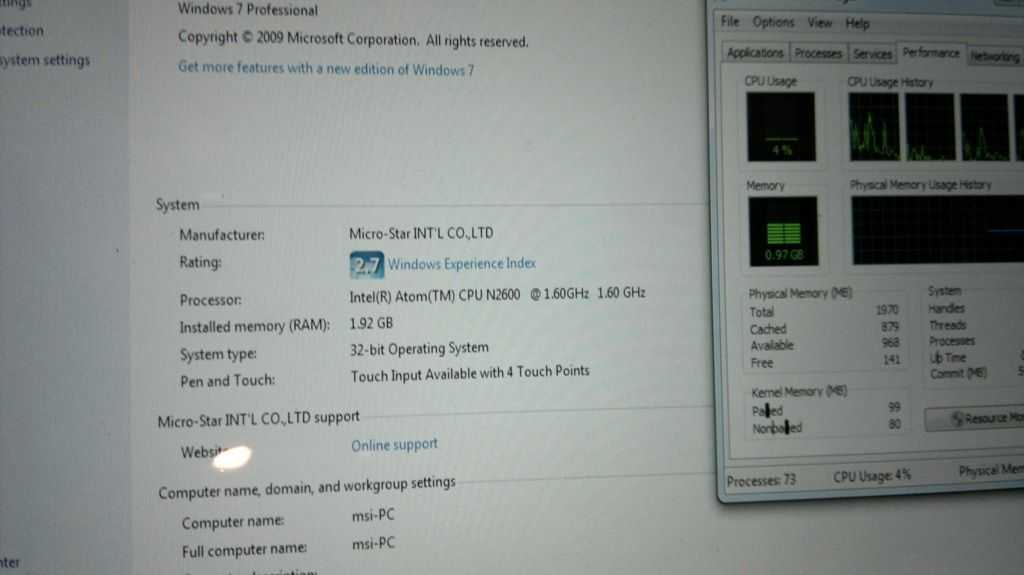
And after a good 10-15 minutes of testing, we saw over 4hrs left on the battery (97%) which is an indicator of working time. Given the low TDP of the Cedar Trail platform we expect it to idle down well to add a few hours to that.
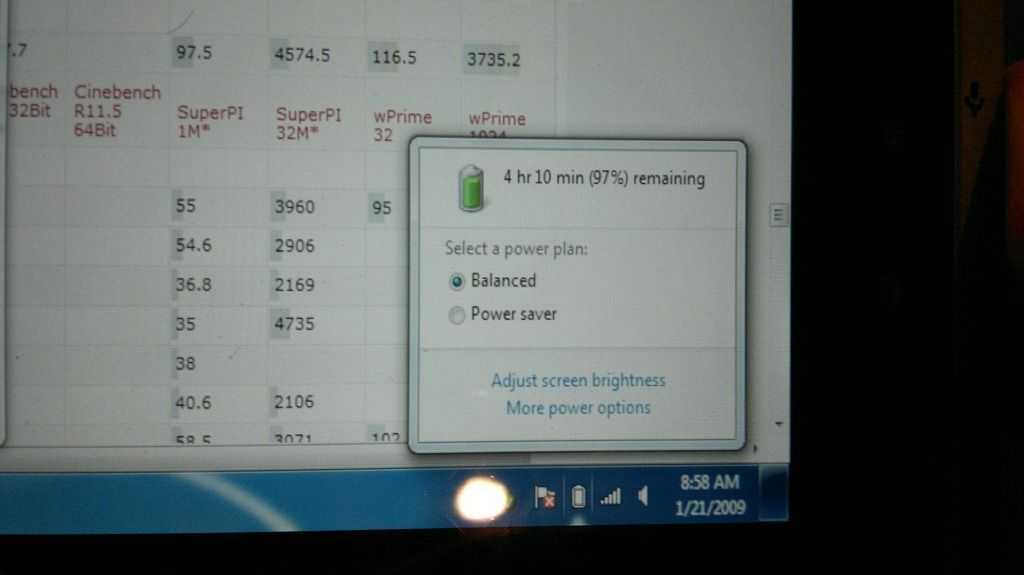
One thing we still haven’t worked out is the screen resolution although the 110W has 1280×800. If that’s the case, this could make the perfect entry-level Windows 8 tablet.
Still outstanding from Cedar Trail tests are definitive 3D graphics performance tests. We’ve seen an indication that the N2800 with the graphics clocked at 650Mhz will be twice as good as the graphics on the Pine Trail generation but remember, the N2600 graphics are clocked lower. Don’t expect anything ground-breaking here.
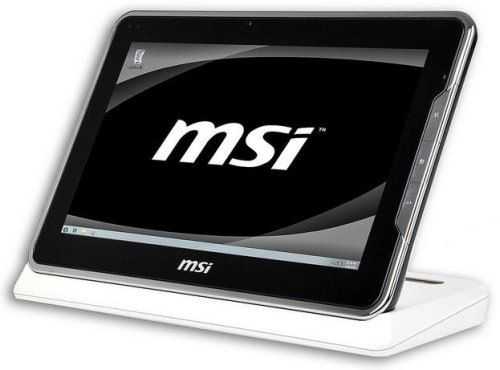
Windpad 100W, 232W Final Specifications Fall Short
Posted on 07 February 2011
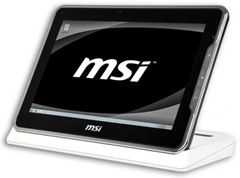 The MSI Windpad is finally available to order in the U.S. (as the Windpad 100W) and in Europe (as the Windpad 232W) and to me it looks like a mish-mash of a Tablet PC that aims to be an all-rounder on specifications and yet ends-up being a master of nothing.
The MSI Windpad is finally available to order in the U.S. (as the Windpad 100W) and in Europe (as the Windpad 232W) and to me it looks like a mish-mash of a Tablet PC that aims to be an all-rounder on specifications and yet ends-up being a master of nothing.
The 10 inch screen is 1024×600 average. The capacitive screen sits on top of the mouse and pen-focused Windows 7 Mis-match. The GMA500/1.6Ghz Menlow platform isn’t the best at helping Windows 7 along. An 800gm weight is unlikely to house a battery that offers more than 4 hours. The U.S. version appears to be missing the Bluetooth module. The price isn’t exactly stunning. There’s only one USB port.
With an SSD, a 1.6Ghz Atom and 2GB of RAM you’d expect it to run reasonably well but Engadget reported from CES that “Windows 7 is seriously laggy and unresponsive inch which means it could have a slow SSD set-up inside.
The differences in specs between the 100W and 232W are subtle but it looks like the EU gets the more complete tablet package with Windows Home Premium and Bluetooth included in the 232W. Oh, and we’re not sure if that docking station is included too so please check before ordering. Better still, wait for some reviews to filter through first. We’ll add them to the product page when we find them.
I’m not a big fan of 10 inch tablets myself but I do know what it makes to create a good mobile TabletPC and a good consumer tablet. The two often require different approaches that can’t be addresses in a single product. That single-product approach is what MSI appear to have attempted here.
If the Windpad drops in price, comes with the dock and proves itself through reviews then it might be worth taking a look at as a docked hot-desk solution but for other scenarios, I think there will be better solutions out there.
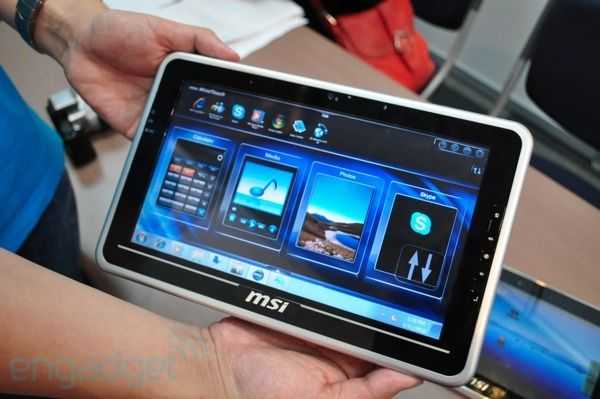
MSI WindPad 100 Delayed for Oak Trail (=2011)
Posted on 25 August 2010
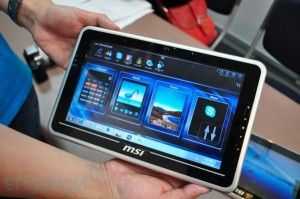 It makes a lot of sense for MSI to wait for the incoming ultra mobile PC platform from Intel rather than launch early with the relatively old Menlow platform and that’s exactly what they’ve gone public about today.
It makes a lot of sense for MSI to wait for the incoming ultra mobile PC platform from Intel rather than launch early with the relatively old Menlow platform and that’s exactly what they’ve gone public about today.
MSI WindPad 100 Delayed, Waiting on Oak Trail.
Oaktrail isn’t expected until 2011 but it represents quite an important redesign for Intels lowest power windows-compatable computing platform. In summary you can expect about 20% performance increase along with about 20% in-use battery life increase. Standby / screen-off battery life should increase by a larger margin. The platform also supports SATA drives and faster memory. More details on Oaktrail here.
The Windpad 100 product page has been updated here.

MSI WindPad 100, Windows 7 Tablet With Dock
Posted on 17 August 2010
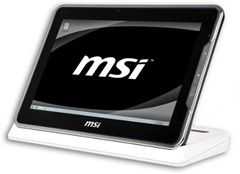 MSI showed us the WindPad 100 back at Computex and early hands on weren’t great but MSI have had plenty time to resolve those prototype niggles and have distributed press images of the production model with its dock.
MSI showed us the WindPad 100 back at Computex and early hands on weren’t great but MSI have had plenty time to resolve those prototype niggles and have distributed press images of the production model with its dock.
The WindPad 100 comes sporting an Intel Atom Z530 CPU running at 1.66GHz, 2GB RAM, 32GB SSD, WiFi, HDMI and 2 USB ports on board with the dock adding additional connectors in the form of 2 USB ports, audio jacks, LAN, VGA, HDMI and the usual DC socket for charging.
Its a sleek design and with the dock may make a compelling package for anyone wanting the full desktop operating system experience of Windows 7. MSI will also package their own ‘Wind Touch’ overlay to help you work the 10.1 inch, multi touch capacitive display. An optional 3G model has been speculated and last we heard the device itself would set you back $499 USD.

There are still a lot of questions about Window 7’s ability at being touch friendly and many have already discounted it as a viable tablet operating system, however with the right optimisations Microsoft and MSI could pull off a tablet which appeals to the masses.
We expect to see more at IFA in Berlin next month.
Check out the details of the WindPad 100 in our product database and more images in the gallery
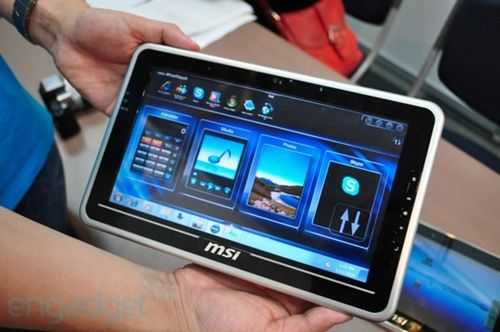
MSI Unveils the Wind Pad 10” Slate
Posted on 31 May 2010
 MSI, the maker of some fairly well regarded netbooks, is going to be bringing the “Wind Pad 100 inch slate to market. The keyboardless 10 inch capacitive touch unit will be powered by the Atom Z530 CPU and will have HDMI out, presumably for 720p video output to an HDTV. The MSI product manager says that the MSI Wind Pad 100 will be available “later this year inch for $499, according to Engadget.
MSI, the maker of some fairly well regarded netbooks, is going to be bringing the “Wind Pad 100 inch slate to market. The keyboardless 10 inch capacitive touch unit will be powered by the Atom Z530 CPU and will have HDMI out, presumably for 720p video output to an HDTV. The MSI product manager says that the MSI Wind Pad 100 will be available “later this year inch for $499, according to Engadget.
Sadly, the device will be running Windows 7 with an ugly tack-on touch interface which is sure to not be any more useful than the Origami ultra mobile PC software once was. Engadget is already saying the following about the “Wind Touch inch UI:
Our biggest concern about the tablet comes down to speed. We noticed it taking a few seconds for applications to launch, and the Wind Touch UI was incredibly sluggish. Speaking of the UI, it’s just a basic skin on top of Windows and is clearly still being tweaked.
I couldn’t tell you exactly why MSI (or anyone for that matter) thinks that slates running Windows 7 will be even the slightest bit consumer friendly. MSI (and again, anyone else) will not be able to provide a good computing experience with an interface that just sits on top of Windows.
[Engadget]
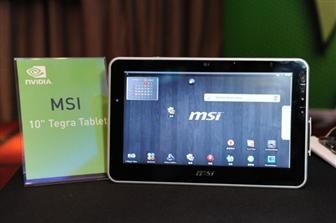
MSI Tegra 2 Tablet later in 2010
Posted on 28 January 2010
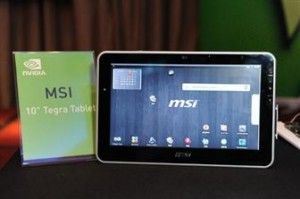 Some might say MSI is mad to try and get tablet news out there right now but I think otherwise. There’s a huge wave of new tablet-focused customers searching and learning today so it makes sense to try and get news and images out.
Some might say MSI is mad to try and get tablet news out there right now but I think otherwise. There’s a huge wave of new tablet-focused customers searching and learning today so it makes sense to try and get news and images out.
Digitimes is helping them out today with news that their tablet, a Nvidia Tegra2-based device seen running Android with a 10″ colour touchscreen in the image above, will be out in the second half of 2010 for a price of about $500. Clearly MSI are a long way away from any formal commitment saying only that they will have different models based on customer demand.
We have this one on the ‘watch’ list.

Netbooks for Laggards?
Posted on 14 May 2009
This strikes me as tail-end marketing.
Simply buy an MSI WInd netbook in the next 3 weeks (in Germany) and you can send a form in to receive one of 7 possible ‘presents’ including a grill and a grill-set. Are they shifting stock or trying to sell to the laggards? If it’s the latter then we could be seeing the end of the netbook-rush sooner than we think.
 |
| |||
 |
| |||
 |
| |||
 |
| |||
 |
| |||
 |
| |||
 |
| |||
 |
| |||
 |
| |||
 |
|



